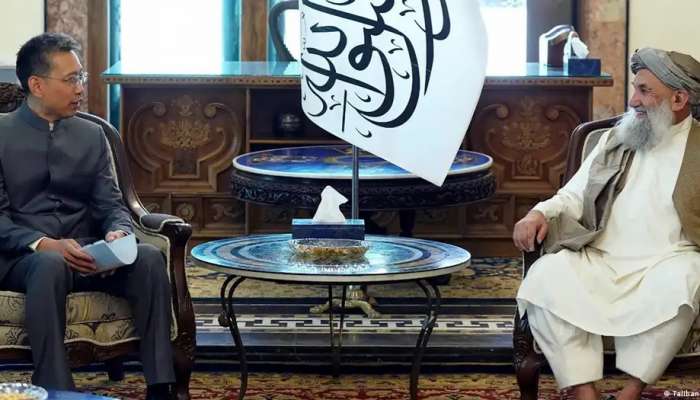
Kabul: Kabul witnessed a flurry of diplomatic activity at the end of January, with 11 countries accepting the Taliban's invitation to attend an international conference dubbed "Afghanistan Regional Cooperation Initiative."
The multilateral meeting was aimed at developing regional cooperation and was attended by representatives of countries like India, China, Russia, Pakistan and Iran, among others, according to Taliban authorities.
It wasn't clear whether the gathering produced any concrete results. But the conference seems to underline the will of the Taliban regime to build good relations with neighboring countries.
The Islamic fundamentalist group can claim some initial success in its efforts to gain international recognition, like when China's President Xi Jinping accepted the credentials of Mawlawi Asadullah Bilal Karimi, the Taliban-appointed Afghan ambassador, at the end of January.
China stressed that the diplomatic accreditation does not mean Beijing officially recognizes the current rulers in Afghanistan. Nevertheless, the two countries have moved closer together since the Taliban took power in August 2021.
According to a report by the media outlet Al Jazeera, several Chinese companies signed a series of business deals with the Taliban in 2023. These include a 25-year oil production contract with an estimated investment value of $150 million (€137.5 million) in the first year, which would rise up to $540 million in the following three years.
Iran has also been cultivating closer relations with Kabul for years. Tehran named Iranian diplomat Hassan Kazemi Qomi as the country's special envoy for Afghanistan in October 2021, just months after the Taliban takeover.
Even though the Iranian government has stopped short of recognizing the Taliban government, it has signaled it considers contacts with the Taliban to be beneficial for the entire region.
India appears to take a similar view, emphasising political stability in the country.
These developments in the region reflect a trend toward diplomatic relations with the Taliban. According to a report by the think tank International Crisis Group, Afghanistan's neighbors are increasingly in favor of moving closer to the regime in Kabul. "We can't wait for the mood in the West to change in favor of the Taliban," the ICG report quotes an unnamed diplomat from the region. "We are on the front line here."
For the Taliban, rapprochement with their neighbors would be a win, said Thomas Ruttig, co-founder of the independent think tank Afghanistan Analysts Network.
The Taliban had sought international recognition even when they were in power the last time round, from 1996 to 2001, he pointed out. Ruttig added that the group understands there are enormous barriers to establishing links with the West in view of the Taliban's harsh policies toward its own population, particularly its suppression of women's rights.
"As a result, the Taliban are now concentrating on the states within the region, as it is proving somewhat easier to establish contacts there," Ruttig told DW.
The ICG report underlines that the rapprochement is not so much about ideological similarities, but rather shaped by concrete geopolitical interests, including the desire to maintain regional security and stability.
Ruttig said fighting terrorism is a key shared goal of Afghanistan's neighbors, from the Central Asian republics to China and Iran, among others.
The situation in Pakistan shows how problematic the fight against terrorism, without international cooperation, could be.
According to the magazine The Diplomat, terrorist attacks in Pakistan have increased significantly since the Taliban took power — by almost 70% in 2023 alone. About 970 people have lost their lives and around 1,350 people have been wounded.
The Taliban have so far not taken action against the terrorist group Tehreek-e-Taliban Pakistan — either because they are not in a position to do so or to exert political pressure on the neighboring country. The Diplomat suspects Pakistan's deportation of hundreds of thousands of Afghan refugees came in response to the Taliban's inaction.
Still, the two countries are holding talks on economic issues, such as the establishment of new trade routes.
Ruttig said most of the terror-affected states are relying on Taliban cooperation. "They hope that the Taliban will take action against their most important domestic enemies. In return, the neighboring states are dangling diplomatic recognition," he said.
"Although the Taliban are taking action against some groups, they are not taking action against all of them. For example, they have so far refused to extradite Uyghurs to China, which the previous government had done."